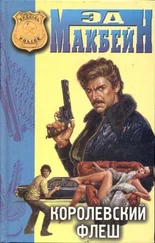“Hello, Eileen,” Hawes said to her as he led the fat black gritsvictim past her and out of the squadroom, presumably to confront the grits-tossing wife in the sanctity of their own peaceful home. Eileen watched Hawes as he disappeared down the corridor. He had red hair, much like her own. She wondered idly if the progeny of two redheaded people would also be redheads. She wondered idly if Hawes was married. She began jiggling one foot.
Some three feet away from where she smoked her cigarette and impatiently jiggled her foot, Meyer was on the telephone with his wife, telling her he’d delivered a baby right here in the squadroom with a little — but only a little — help from Alf Miscolo, who was at the moment down the hall in the Clerical Office, brewing another pot of coffee now that his hot water was no longer urgently needed in maternity cases. On another telephone, at his own desk, Carella finally made contact with Levine at Midtown East, and began apologizing to him for having taken so long to get back.
It had taken him all this while to get back because a police department is like a small army, and a homicide is like a big battle in a continuing war. In big armies, even small battles get serious consideration. In a small army like a police department, a big battle like homicide commands a great deal of attention and participation from a great many people all up and down the line. In the city for which these men worked, the precinct detective assigned to any homicide was the one who’d caught the original squeal, generally assisted by any member of the detective team who’d been catching with him at the time. The moment a squadroom detective said, “I’ve got it,” or, “I’m rolling,” or some such other colorful jargon to that effect, the case was officially his, and he was expected to stick with it until he solved it, or cleared it (which was not the same thing as solving it), or simply threw up his hands in despair on it. But since homicide was such a big deal — a major offensive, so to speak — there were other people in the department who were terribly interested in the activity down there at the squadroom level. In this city, once a squadroom detective caught a bona fide or “good” homicide, he had to inform:
The Police Commissioner
The Chief of Detectives
The District Commander of the Detective Division
Homicide East or Homicide West, depending upon where the body was found
The Squad and Precinct Commanding Officers of the precinct in which the body was found
The Medical Examiner
The District Attorney
The Telegraph, Telephone, and Teletype Bureau at Headquarters
The Police Laboratory
The Police Photo Unit
Not all of these people had to be consulted on protocol that Saturday morning. But the situation was knotty enough to cause Lieutenant Byrnes, in command of the 87th Squad, to wrinkle his brow and phone Captain Frick, in command of the entire 87th Precinct, who in turn hemmed and hawed a bit and then cleverly said, “Well, Pete, this would seem to be a matter of ‘member of the force,’ wouldn’t it?” which Byrnes took to mean “member of the force handling the case,” which is exactly what he’d called Frick about in the first place. Frick advised Byrnes to go to superior rank within the division on this, which necessitated a call to the Chief of Detectives, something Byrnes would have preferred avoiding lest his superior officer think he was not up on current regs. The Chief of Detectives did a little telephonic head scratching and told Byrnes he had not had one like this in a great many years and since the police department changed its rules and regulations as often as it changed its metaphoric underwear, he would have to check on what current procedure might be, after which he would get back to Byrnes. Byrnes, eager to remind his superior officer that the men of the Eight-Seven were conscientious law enforcers, casually mentioned that there were two homicides involved here, and two detectives in separate parts of the city waiting to get moving on the second and freshest of the killings (which wasn’t quite true; neither Levine nor Carella was particularly hot to trot) so he would appreciate it if the Chief could get back to him as soon as possible on this. The Chief did not get back until close to 11:00 A.M., after he’d had a conversation with the Chief of Operations, whose office was two stories above the Chief’s own in the Headquarters Building. The Chief told Byrnes that in the opinion of the Chief of Operations, the former homicide took priority over the latter; the member of the force handling the case should be the squadroom detective who’d caught the initial squeal, whenever that had been. Byrnes didn’t know when it had been, either; he simply said, “Yes, whenever. Thank you, Chief,” and hung up, and summoned Carella to his office and said, “It’s ours,” meaning not that it was actually theirs (although in a greater sense it was) but that it was his — Carella’s. When Carella reported all this to Levine, Levine said, “Good luck,” managing to convey an enormous sense of relief in those two simple words.
Hal Willis came back into the squadroom some five minutes later, just as a windblown and frostbitten patrolman from Midtown East was delivering the packet promised by Levine when he’d first spoken to Carella earlier this morning. Willis spotted Eileen sitting on the edge of his desk, smiled, and virtually tap-danced over to her. Grinning, he said, “Hey, they sent you, huh?”
“Here’s that stuff from Levine,” Carella said to Meyer.
“You were hoping for Raquel Welch maybe?” Eileen said.
“Who’s complaining?” Willis said.
“Who raped who this time?” Eileen asked.
“Don’t talk dirty in my squadroom,” Meyer said, and winked at Carella.
“Looks very thin,” Carella said, hefting the yellow manila envelope he had just signed for.
“That it?” the patrolman asked, rubbing his hands together.
“That’s it,” Carella said.
“Anyplace I can get a cup of coffee here?” the patrolman asked.
“There’s a machine downstairs in the swing room,” Carella said.
“I got no change,” the patrolman said.
“Oh, the old Got-No-Change Ploy,” Meyer said.
“Huh?” the patrolman said.
“Try the Clerical Office down the hall,” Carella said.
“Is your insurance paid up?” Meyer said.
“Huh?” the patrolman said, and shrugged, and went down the hall.
“Where do you want to discuss this?” Willis asked Eileen.
“Oh, the old Your-Place-Or-Mine Ploy,” Meyer said. He was feeling terrific! He had just delivered a baby! There was nothing like collaborating in an act of creation to make a man feel marvelous! “Is this the Laundromat case?” he asked Willis.
“It’s the Laundromat case,” Willis said.
“A rapist in a Laundromat?” Eileen asked, and stubbed out her cigarette.
“No, a guy who’s been holding up Laundromats late at night. We figured we’d plant you in the one he’s gonna hit next—”
“How do you know which one he’ll hit next?” Eileen asked.
“Well, we’re guessing,” Willis said. “But there’s sort of a pattern.”
“Oh, the old Modus-Operandi Ploy,” Meyer said, and actually burst out laughing. Carella looked at him. Meyer shrugged and stopped laughing.
“Dress you up like a lady with dirty laundry,” Willis said.
“Sounds good to me,” Eileen said. “You’re the backup, huh?”
“I’m the backup.”
“Where will you be?”
“In a sleeping bag outside,” Willis said, and grinned.
“Sure,” she said, and grinned back.
Читать дальше









